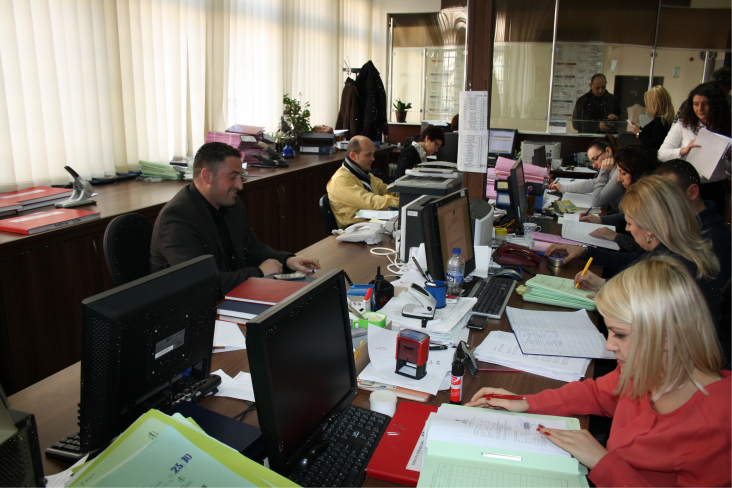
June 2015—When Kosovo’s new decentralized judicial structure went into effect in January 2013, courts had a better model for efficiency moving forward, but faced an uphill battle in tackling the many cases left unresolved under the old system.
As of July 2014, Kosovo’s seven basic courts and their 20 corresponding branch courts had a backlog of approximately 56,300 cases within criminal, civil and serious crimes categories, not including minor offense and enforcement cases. Seeing the impact of this backlog on public faith in the country’s justice system, USAID’s Effective Rule of Law Program stepped in to help out.
Under a pilot program, USAID first embedded a backlog reduction team of professional associates in Podujevë/o Branch Court in late July. Seeing immediate results there, the program embedded teams at two of the country’s busiest regional courts: Gjakova/Đakovica Basic Court and, later, Pristina Basic Court in January 2015.
To date, 11 months after the launch of the first team, over 36,000 cases have been reviewed by the teams and over 8,500 cases have been closed as a direct result of their work.
“I am more than pleased with the quality of the review and summary of cases provided by USAID’s professional associates,” explains Gjakova/Đakovica Basic Court Judge Iliriana Hoti. “Their attention to detail and ability to quickly research and incorporate updates from the Criminal Code is extensive and makes our work as judges more efficient.”
The impact in Gjakova/Đakovica Basic Court is especially noteworthy as the intervention reduced the overall backlog by 16 percent in the first six months. During the same period, the team took significant action on over 75 percent of the cases previously classified as “no action taken to date.”
“We now have a much clearer picture of the workload in this area, and we now have a detailed inventory and status for thousands of cases that have been suspended for many, many years due to the ongoing issues between Serbia and Kosovo,” said Hektor Vula, chief of file registry for Gjakova/Đakovica Basic Court.
The court points to its public notice board as a visual representation of the great work being done in backlog reduction. Once only updated sporadically, the board is now teeming with notices of upcoming hearings and rendered decisions.
“Each notice on that board represents one case that is moving one step closer to finally being resolved,” Vula adds.
USAID’s Effective Rule of Law Program, which runs from March 2011 through September 2015, is designed to help build a more effective and independent justice system in Kosovo.
LINKS
Follow @USAIDKosovo. on Facebook, on YouTube







Comment
Make a general inquiry or suggest an improvement.